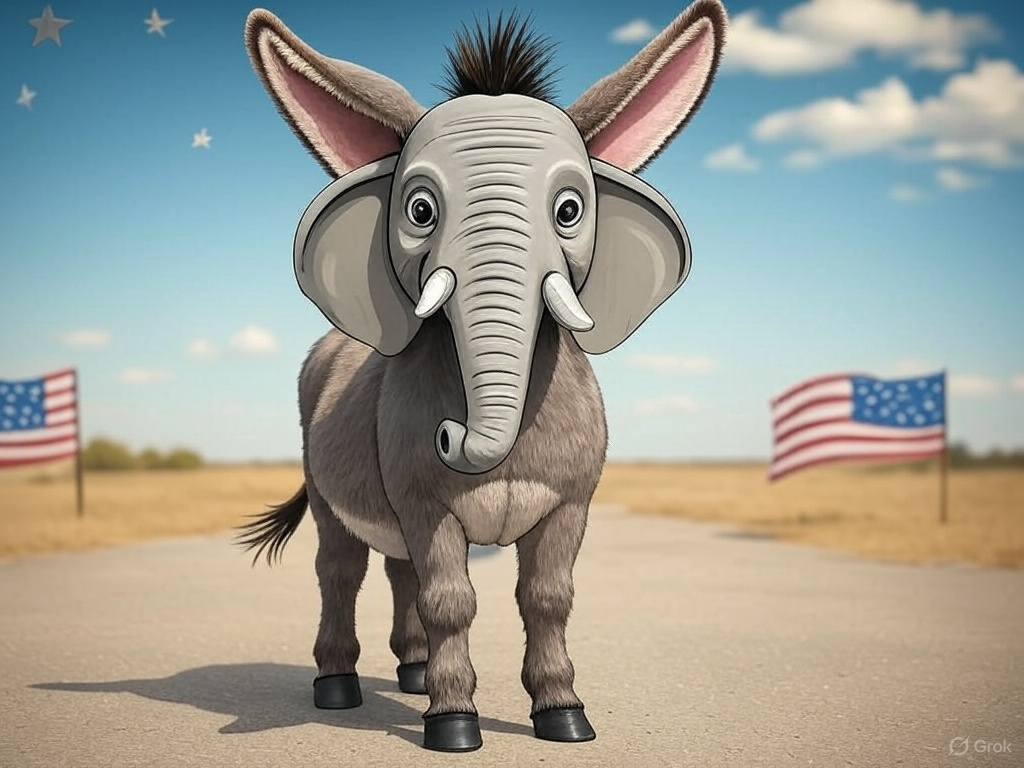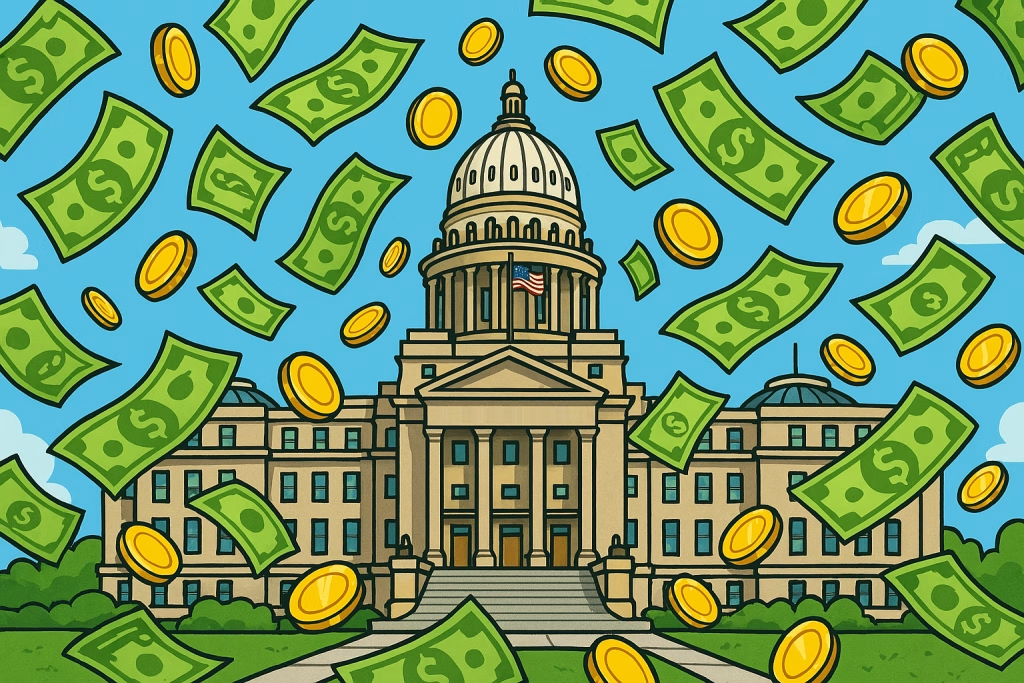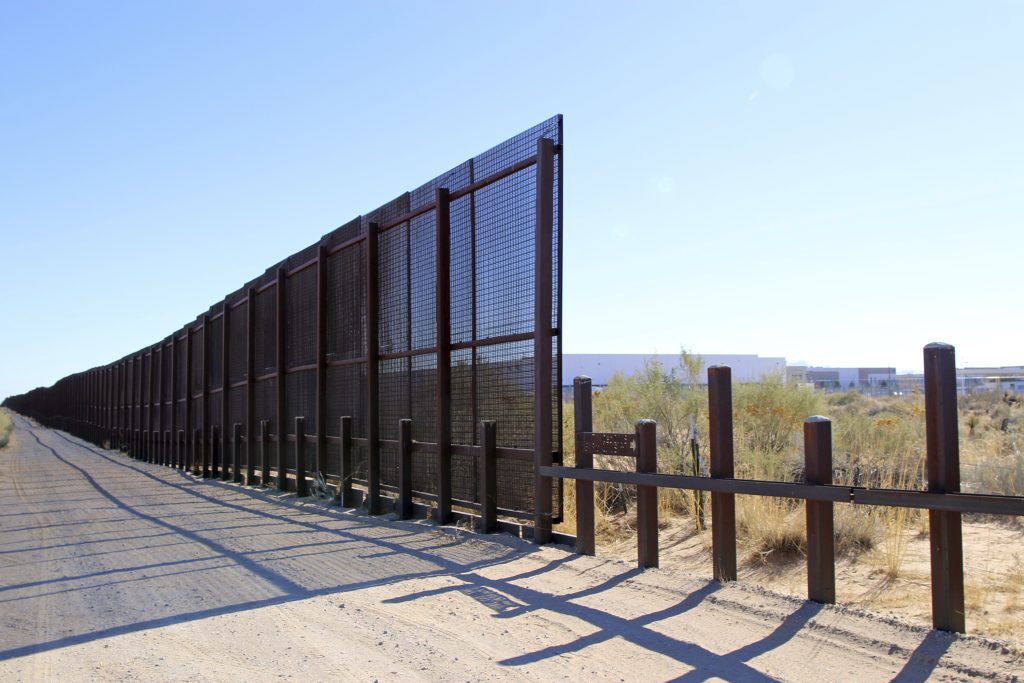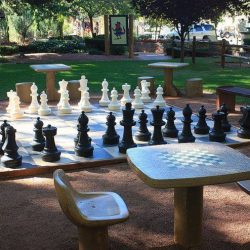On the very last day of the 2025 legislative session, the Senate State Affairs Committee debated a bill that would make highway district elections partisan. The committee voted against the bill, with some members and testifiers intoning that roads don’t have any party affiliation.
Here’s why I think they were wrong.
Despite the influence of big blue Boise, Ada County has remained firmly Republican for several years. All three county commissioners are Republicans, as are all other county elected officials. Last November, Donald Trump defeated Kamala Harris by more than 10% in Ada County, and Prop 1 was crushed by 17%.
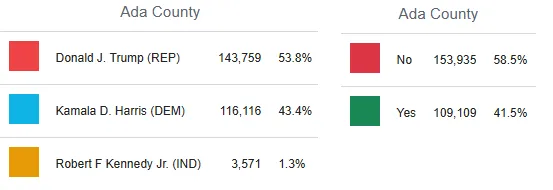
Nevertheless, the Ada County Highway District has moved in something of a progressive direction in recent years. My commissioner is Miranda Gold, former Eagle council member and Bernie Sanders supporter who has never made a secret about her political positions. Gold joined fellow commissioners Alexis Pickering and Jim Hansen last year in voting to reduce State St. to three lanes to allow for more room for cyclists and pedestrians.
While it might not be immediately obvious, reducing car traffic in favor of more bicycles is a left-coded position. It appeals to the young, single, urban professionals that make up the core of the Democratic Party, while taking an antagonistic stance toward the suburban families that make up the Republican Party.
Two decades ago, Steve Sailer wrote about what he coined the “dirt gap” to explain why certain regions vote Republican and others vote Democrat. He found that George W. Bush won the top 26 states with the most affordable housing in the 2004 election, and he contrasted family formation policies between blue California and red Texas. I suspect that effect has only been amplified in the past few years, as thousands of families have left progressive states for places like Idaho, Florida, and Tennessee.
According to Sailer’s analysis, the policies most driving migration and voting patterns are not the big social issues we read about in headlines, but things like traffic and housing—the very things we’re told are not partisan at all. Polling backs this up, with surveys consistently showing that married men and women vote Republican far more often than their single or divorced counterparts.
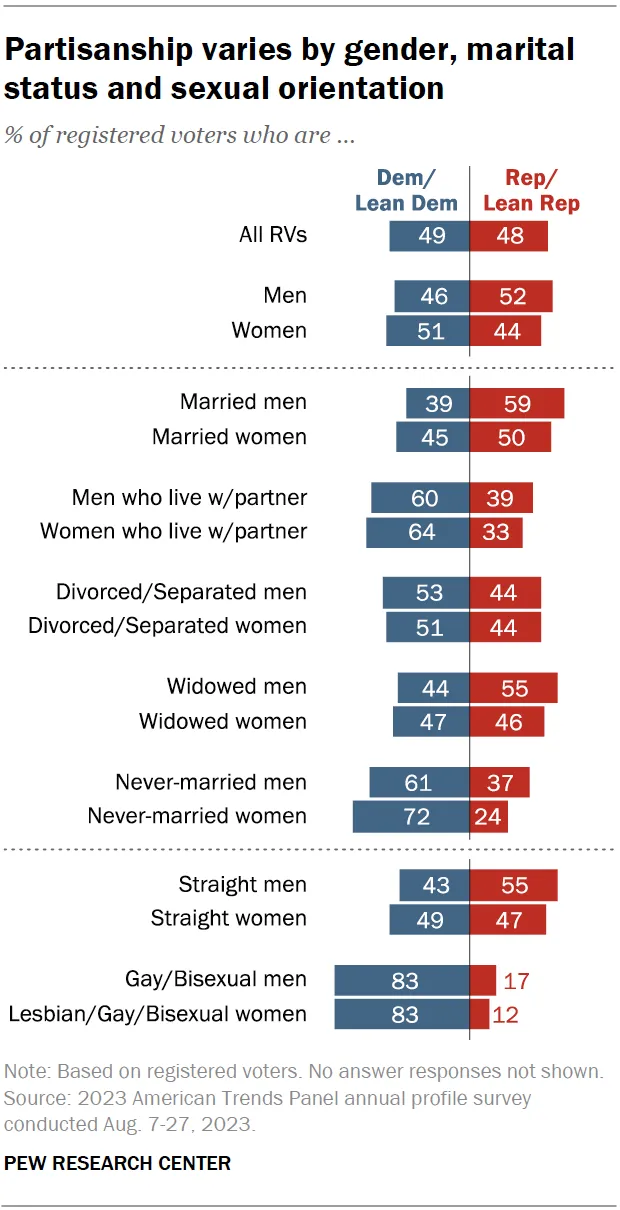
The deep philosophical differences between Republicans and Democrats play out in myriad ways, even in local offices such as highway district, city council, and school board. Do you believe that tax dollars belong to the government, or to the people? Do you believe parents are ultimately responsible for their children, or the state? Do you believe that we must allow so-called experts to decide how we live, or can we rule ourselves? Party affiliation is a useful proxy for these principles, a signal to voters about how a candidate generally sees the world.
Earlier this week, blogger Brian Holmes seemed incredulous that the Eagle Sewer District race had taken on a partisan flair. Several candidates have put their party affiliation and fiscal conservatism front and center, which has irritated other candidates who want to keep pretending that partisanship has no place in the sewer board room.
One or more of the non-conservative candidates appears to have created a flier and passed it out throughout several neighborhoods in Eagle accusing the conservative candidates of being part of a “political coup” to take over the city:
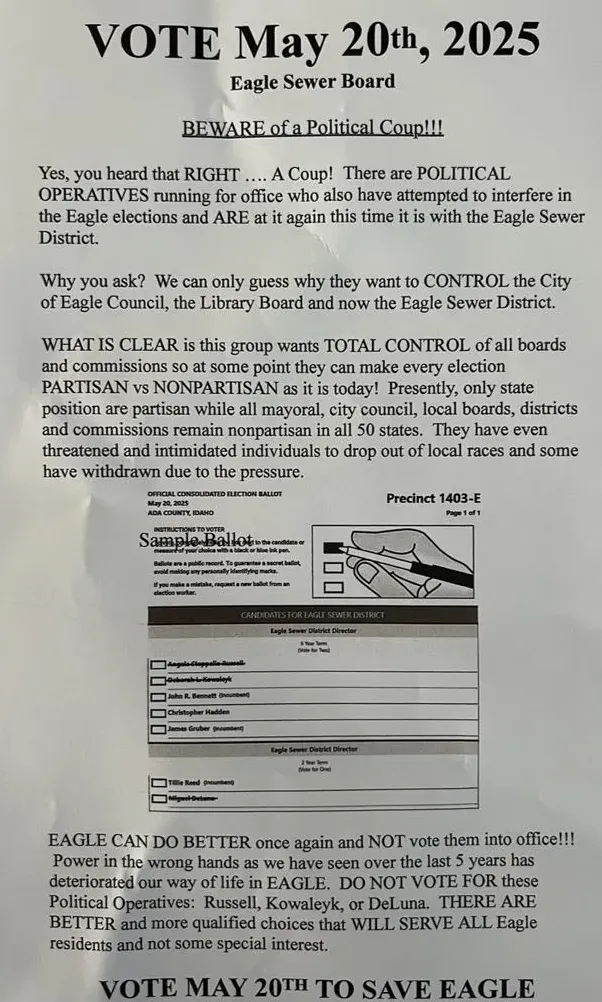
I have my suspicions as to who wrote this, but I need not dignify that person by giving them the attention they so desperately crave. Suffice it to say that someone who reacts this hysterically to candidates promoting themselves as fiscal conservatives is probably not acting in good faith. Note how the candidates who scream the loudest about being nonpartisan are the ones whose values likely run counter to the majority of voters in Idaho.
In ruby red Idaho, “nonpartisan” is the sheep’s clothing that leftist wolves wear to hide their true intentions. Ask yourself which party is more likely to support the following positions at the local level:
- Raising taxes
- Ensuring children can continue to access inappropriate materials in libraries
- Hiring a superintendent who believes in pushing progressive activism in K-12 schools
- Shrinking roads to make more room for bicycles
- Imposing mask mandates in the event of a pandemic
It’s obvious to me that a candidate’s worldview—the set of values and assumptions they use to make decisions, is of utmost importance—whether they are running for school board or state legislature.
The Ada County Republican Central Committee has stepped up this year to provide voters with more information about candidates for supposedly nonpartisan races. A subcommittee reached out to all registered Republicans in these local races and asked them to fill out a questionnaire and sit for an interview. All Republican candidates, even those who declined to participate, are listed on the Ada GOP website, with helpful information. For example, one of the Republican candidates for Ada County Free Library District is running on a slate with a Democrat, which seems like something voters should be made aware of.
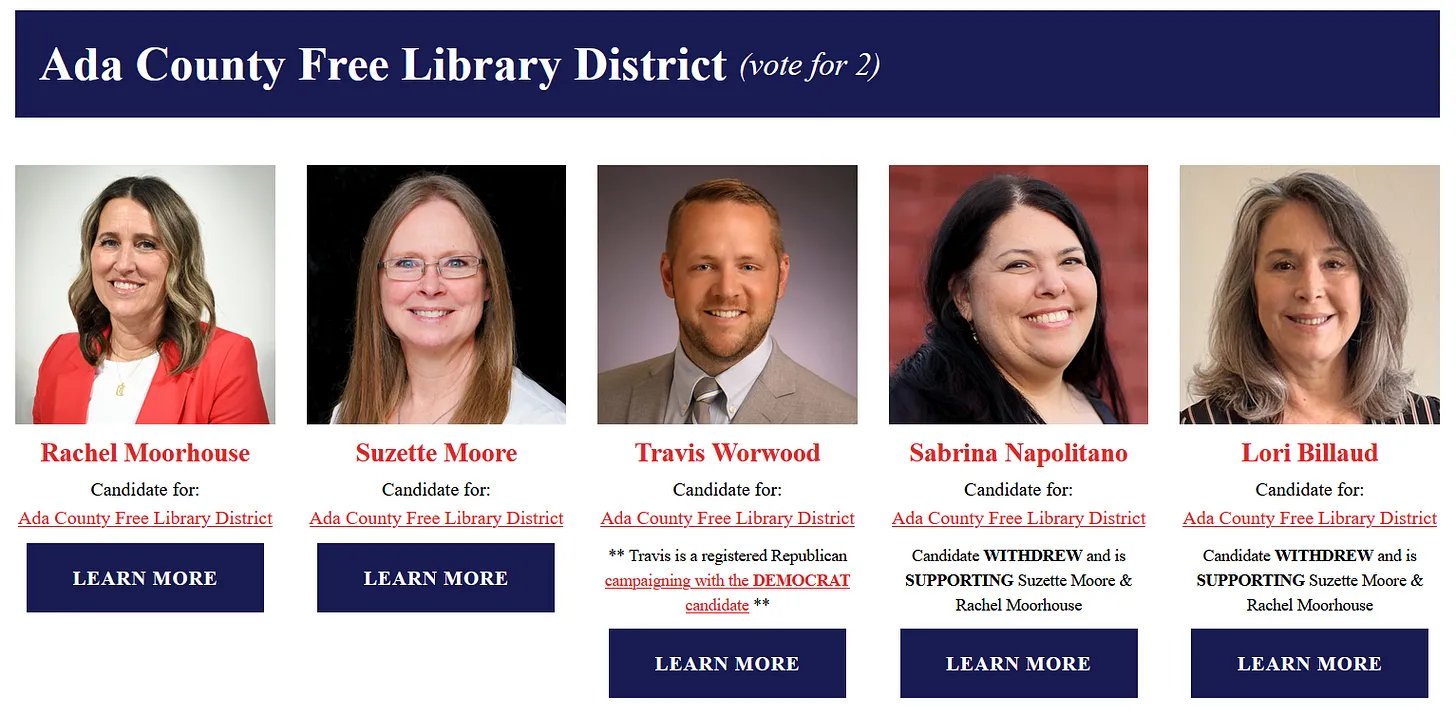
That particular candidate attended a recent ACRCC meeting wearing what appeared to be a rainbow flag pin, another important data point for Republican voters. Like it or not, public libraries are now battlegrounds in the culture war, so the worldview of candidates for a library board should matter greatly to voters.
Partisanship isn’t a dirty word. Political parties are simply associations of mostly like-minded people who work together to advance shared goals. That doesn’t mean we march in lockstep. As a Republican district chairman, I work to elect and promote Republican candidates, but I’m still free to disagree—and anyone who regularly reads this platform knows that. While Republicans often debate and disagree among themselves, the differences between Republicans and Democrats are nevertheless stark, and those differences shape the decisions a candidate will make at every level of elected office.
Partisanship is not about injecting politics into nonpolitical areas; it’s about shedding light on the worldviews of the people on your ballot.
Gem State Chronicle is a reader-supported publication. To receive new posts and support my work, consider becoming a free or paid subscriber.
About Brian Almon
Brian Almon is the Editor of the Gem State Chronicle. He also serves as Chairman of the District 14 Republican Party and is a trustee of the Eagle Public Library Board. He lives with his wife and five children in Eagle.


